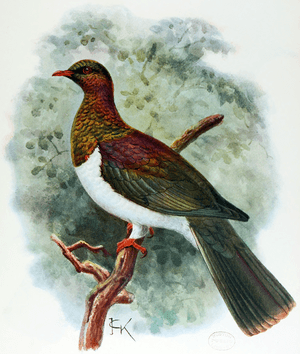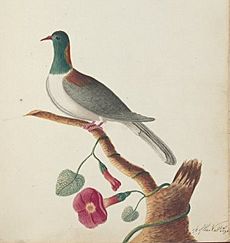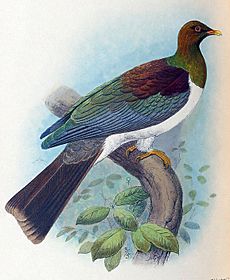Norfolk pigeon facts for kids
Quick facts for kids Norfolk pigeon |
|
|---|---|
 |
|
| Illustration by Keulemans, 1907 | |
| Conservation status | |
| Scientific classification |
|
| Kingdom: | Animalia |
| Phylum: | Chordata |
| Class: | Aves |
| Order: | Columbiformes |
| Family: | Columbidae |
| Genus: | Hemiphaga |
| Species: |
H. novaeseelandiae
|
| Subspecies: |
H. n. spadicea
|
| Trinomial name | |
| Hemiphaga novaeseelandiae spadicea Latham, 1801
|
|
The Norfolk pigeon (Hemiphaga novaeseelandiae spadicea) was a special type of New Zealand pigeon. People sometimes called it the Norfolk Island pigeon or a wood quest. This bird lived only on Norfolk Island, a small island in the Pacific Ocean. Scientists believe these pigeons flew to Norfolk Island from New Zealand a very long time ago. Sadly, the Norfolk pigeon became extinct around the year 1900.
Contents
What Was the Norfolk Pigeon Like?
We don't know exactly how many Norfolk pigeons lived on the island when people first settled there. Early notes mention the birds were present. However, they don't say if there were many or just a few.
Based on other pigeons like it, the Norfolk pigeon probably ate mostly fruit. It would have relied on different fruiting plants for its food.
Why Did the Norfolk Pigeon Disappear?
The Norfolk pigeon became extinct because of several problems happening at once. These problems included:
- New animals like cats and weasels were brought to the island. These animals hunted the pigeons.
- People cleared forests to build homes and farms. This destroyed the places where the pigeons lived and found food.
- People also hunted the pigeons for food.
Before Europeans arrived, Polynesian settlers on the island also hunted these birds. But when Europeans came, the Polynesians had left, and the pigeons were still there. Europeans then started hunting the birds for food.
An officer named Abel Dottin William Best wrote in his journal in 1838 that the pigeons were still common. He even recorded hunting 72 birds himself in a short time. The very last time anyone saw a Norfolk pigeon was in 1901. Hunting by humans was likely the main reason these birds disappeared forever.
About the Specimens
The first official description of the Norfolk pigeon was written by John Latham in 1801. Today, we know of only 20 Norfolk pigeon specimens (preserved birds).
- Three specimens are in the Natural History Museum in Leiden.
- Two are in the Natural History Museum in New York.
- One specimen is in the World Museum Liverpool.
Scientists have studied DNA from these specimens. They found that the Norfolk Island pigeon was very closely related to the New Zealand Hemiphaga novaeseelandiae population.
Remembering the Norfolk Pigeon
To remember this special bird, the Government of Norfolk Island released a stamp. This stamp, showing the Norfolk pigeon, came out on February 24, 1971.
 | Janet Taylor Pickett |
 | Synthia Saint James |
 | Howardena Pindell |
 | Faith Ringgold |




